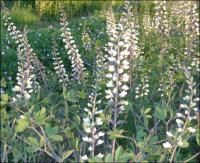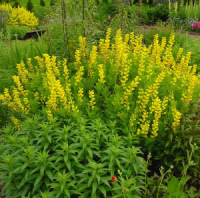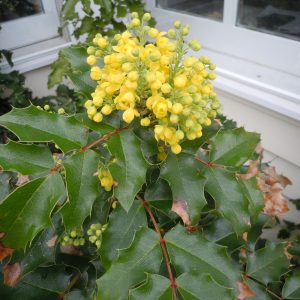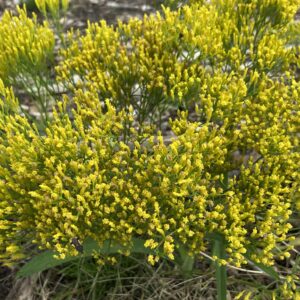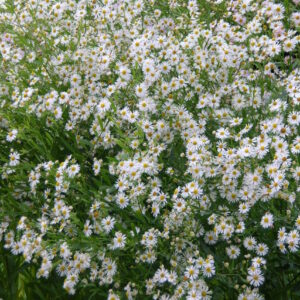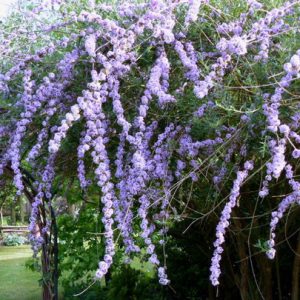Plants for Butterflies and Other Pollinators
Showing 33–40 of 211 results
-
Baptisia leucantha syn. Baptisia lacteata, Baptisia alba White Wild Indigo, Prairie wild indigo Z 3-9
Towering creamy white flower spikes in May & June followed by dark seed pods.
Towering creamy white flower spikes in May & June followed by dark seed pods.
Size: 3-5' x 2-3'
Care: full sun to part shade in rich well-drained soil.
Native: Wisconsin native – from Minnesota to Texas.
Wildlife Value: food source for several caterpillars and nectar and pollen for a number of butterflies and bees. Deer resistant.Winnebago (HoChunk) mashed cooked root to make a poultice applied to remedy inflammation of the womb. Baptisia is Greek meaning to dye referring to use of Baptisia australis as a substitute for indigo dye. Leucantha means white flowered.
-
Baptisia sphaerocarpa Yellow wild indigo Z 5-8
Spikes of yellow pea-like flowers in spring cover this broad plant - really makes you say “awe” or “oooh” when it blooms. All season resembles a shrub Flowers turn into round seed pods the size of a marble. This is a legume that improves soil fertility by making nitrogen available to the Baptisa and surrounding plants.
Spikes of yellow pea-like flowers in spring cover this broad plant – really makes you say “awe” or “oooh” when it blooms. All season resembles a shrub, flowers turn into round seed pods the size of a marble. This is a legume that improves soil fertility by making nitrogen available to the Baptisa and surrounding plants.
Size: 3’ x 3’
Care: sun to part shade in moist well-drained to dry soil.
Native: Missouri to Mississippi to TX
Wildlife Value: Attracts butterflies. Deer resistant
Awards: Missouri Botanic Garden Plant of Merit.Baptisia is Greek meaning “to dye” referring to use of Baptisia australis as a substitute for indigo dye. Sphaerocarpa means “round seed.” Collected before 1834 by Thomas Nuttall (1786-1859) English planthunter who scoured the US from the Atlantic to the Pacific.
-
Berberis aquifolium syn. Mahonia aquifolium Oregon grape Z 5-9
Clusters of buttercup yellow flowers in spring followed by glaucous blue fruit with red stems. Holly-like, evergreen leaves turn purple in fall for a four-season ornament.
Clusters of buttercup yellow flowers in spring followed by glaucous blue fruit with red stems. Holly-like, evergreen leaves turn purple in fall for a four-season ornament.
Size: 5’ x 3’
Care: sheltered site (in Z 5) in humusy, moist to moist well-drained soil, sun to part shade
Native: Pacific Northwest
Wildlife Value: Attracts bees & butterflies, Birds eat the berriesSnohomish ate the berries and made a yellow dye from its roots. It cured bloodshot eyes and kidney disease for Okanagan-Colville. California’s Karok Indians boiled the root and drank the liquid to cure numerous ailments. Steamed roots and leaves believed to remedy yellow fever. Lakota Sioux treated stomach, digestive, kidney and breathing ailments with this. Mahonia is named in honor of Bernard McMahon, (1775-1816) Scottish nurseryman who immigrated to Philadelphia around 1802. McMahon’s nursery received some seeds of plants and plants discovered by Lewis & Clark who collected this plant in April 1806 along the rapids of the Columbia River.
-
Bigelowia nuttallii Nuttall’s rayless goldenrod Z 4-10
Clouds of soft yellow flower clusters rise above evergreen foliage from mid-summer through fall on this short plant.
Clouds of soft yellow flower clusters rise above evergreen foliage from mid-summer through fall on this short plant.
Size: 10-12” x 5”
Care: sun in well-drained soil, perfect rock garden plant
Native: Southern US; TX, LA, AL, GA, FL
Wildlife Value: attracts honeybeesPossibly collected by Thomas Nuttall, for whom it is named, before 1818. Collected again on banks of Ohoopee River in Tattnall County GA before 1970.
-
Bletilla striata syn. B. hyacinthina Chinese ground orchid Z 5-9
Racemes of pinkish-purple flowers on scapes above dark green, upright, lance-shaped leaves, April-May
Five to 7 flowers, about 2” across grow toward the top of a stem ladder-like. Each flower has 6 lobes, 3 on the upper half and two on the lower half. These lobes, purplish, red, or pink, are elongated-oval in shape. A rectangular lobe with undulating surface, like an open accordion, protrudes from the center, hanging down.
Size: 12-18” x 12”
Care: Part shade in moist, well-drained soil.
Native: China, Japan
Wildlife Value: Attracts bees, butterflies and hummingbirds. Deer & Rabbit resistant.
Awards: Royal Horticultural Society Award of Garden MeritProtect with thick winter mulch, may not reliably survive Zone 5 winters.
Spreads slowly by rhizomes and seeds in optimal conditions.
‘Bletilla’ honors Louis Blet, a Spanish apothecary in Algeciras who also had a botanic garden at the end of the 18th century. Collected before 1784 by Thunberg. -
Boltonia asteroides False starwort, Bolton’s aster Z 4-9
“Bloom profusely” majestic, white daisies cover imposing, cheerful plant, August – September
“Bloom profusely” majestic, white daisies cover imposing, cheerful plant, August – September
Size: 5-6' x 3'
Care: full sun to part shade in moist well-drained soil.
Native: Maine to Florida, west to Texas and north to North Dakota and all areas in between
Wildlife Value: Supports over 40 bee species, moths, butterflies, and wasps.Named in honor of 18th century English botanist, James Bolton. Asteroides means resembling as aster. Species introduced in 1758. Recommended for fall blooms in Wisconsin State Horticultural Society Annual Report, 1911.
-
Bouteloua curtipendula Sideoats grama Z 4-8
Narrow, blue-green leaves tinged purple or red in fall when golden oat-like seeds hang down one side of each leaf, eye-catching.
Narrow, blue-green leaves tinged purple or red in fall when golden oat-like seeds hang down one side of each leaf, eye-catching.
Size: 2-3' x 1'
Care: Sun in well-drained to moist well-drained soil, drought tolerant
Native: most of US, incl. Wisconsin
Wildlife Value: nesting material for butterflies and bees; larval host for some Skipper butterflies,
Awards: state grass of TexasKiowa natives who had killed an enemy in battle with a lance wore this. Collected and described by French planthunter André Michaux (1786-1802) who scoured Eastern North America west to the Mississippi over 11 years.
-
Buddleja alternifolia ‘Argentea’ Silver fountain butterfly bush Z 5-9
Graceful, arching, weeping silvery foliage with cascading lavender flowers
Graceful, arching silvery foliage and, in early summer, lavender, fragrant flowers cascade all along the stems. A cloud of purple.
Size: 8-10” x 8-10” fast growing
Care: sun to part shade in moist well-drained to well-drained soil. Prune just after blooms finish if you wish.
Native: China & Japan
Wildlife Value: attracts butterflies
Awards: 1998 Plant Select ® awardBuddleja named to honor botanist Reverend Adam Buddle, Vicar of Farmbridge in Essex, (1662-1715) Alternifolia means the leaves alternate on the stem. The 1st Buddleja alternifolia was found by plant hunter and horticulture author Reginald Farrer (1880-1920) in western China in 1914. The cultivar’s name ‘Argentea’ means silver due to the tiny hairs on the foliage giving the plant a silvery appearance. ‘Argentea’ selected at Hillier Nursery in England in 1939.

